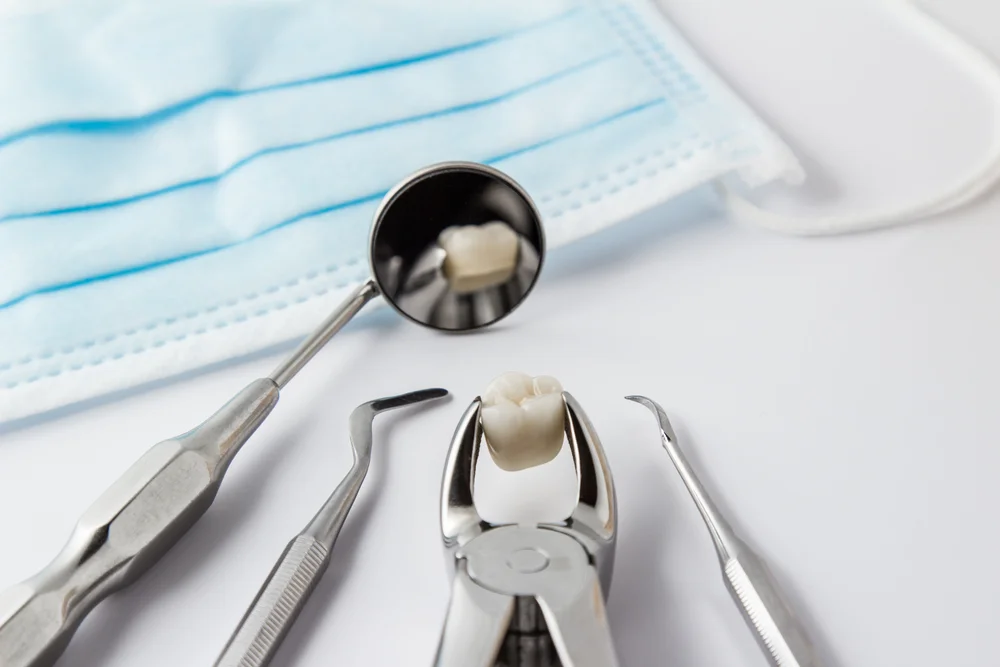Tooth Extraction in Winnipeg
Sometimes, damaged teeth can be restored with fillings, dental crowns, or root canals. But in some cases, the best option is to have the tooth extracted. Doing so can protect your surrounding teeth and your overall oral health.
At our Winnipeg dental centre, we offer extraction procedures for decayed teeth, infected teeth, or impacted wisdom teeth. Our tooth extraction services are safe and effective. Here’s a bit more information about what we have to offer:
What is a Tooth Extraction?
As a child, you might have removed a loose tooth using your fingers. But extracting a fully-grown molar is a different process altogether. There are two different types of tooth extractions:
- Simple tooth extraction. When the tooth has emerged from the gums, it can be removed using dental tools. First, the tooth is loosened using an elevator; once it’s ready, the dentist uses forceps to extract the tooth.
- Surgical tooth extraction. The dentist may need to use a scalpel to make an incision in the gums and access the tooth underneath. They may need to remove a portion of the gum tissue to remove the tooth. This procedure is more invasive than a simple extraction, and usually involves a longer recovery period.
Once the tooth is extracted, a blood clot will form in its place. This is an important part of the healing process. To avoid dislodging the blood clot and creating a dry socket, refrain from smoking or using a straw as you recover from your procedure. It typically takes 7-10 days to heal from a tooth removal.


Reasons for Tooth Extraction
No one wants to lose a tooth. But if that tooth is causing pain, discomfort, and damage to your other teeth, having the tooth extracted may be preferable. Your dentist might recommend a tooth extraction for any of the following reasons:
- Impacted wisdom teeth. For some, the eruption of their wisdom teeth is a relatively painless experience—for others, it’s quite the opposite. If your wisdom teeth don’t have enough space to emerge properly, they can grow into the neighbouring teeth and cause extensive damage.
- Broken or cracked teeth. Once a tooth becomes too damaged to save, an extraction may be the best way to restore your dental health.
- Infected teeth. Left untreated, a tooth infection can spread to other areas of your mouth and body. Pulling the tooth may be the only way to remove the infected tissue completely.
- Gum disease. When gum disease reaches the advanced stages, teeth may become loose or vulnerable to developing an infection. While an extraction will not cure gum disease, it can be used to remove teeth that are only contributing to a patient’s discomfort.
Following a tooth extraction, the next step is to look at tooth replacement options. With a missing tooth, you may find it difficult to chew certain foods or speak comfortably. You might consider dental implants, dentures, or dental bridges. Talk to your dentist to learn more about tooth replacements.


When Is Oral Surgery Necessary?
When wisdom teeth are impacted, you may need to have them extracted even before they emerge above the gum line. During oral surgery, your dentist will make an incision at the gum line to access the tooth.
The roots of your teeth are nearly as unique as your fingerprints. If you have a tooth with an especially long or curved root, oral surgery may be the only way to successfully remove it.
Are you concerned about feeling pain during your procedure? Your dentist will inject local anaesthesia into the surgical site to numb any pain you might feel. You can expect to feel pressure as the tooth is removed, but it shouldn’t be painful. If you prefer, you may even choose to be sedated during your oral surgery.
Book A Free Consultation
To promote a healthy mouth, sometimes your best option is to remove an impacted or damaged tooth. It’s an effective way to prevent gum disease, tooth infections, and damage to your other teeth.
Do you need tooth extractions in Winnipeg? At our dental centre, we offer dental procedures to address decayed or infected teeth. Our dentists aim to make your extraction as comfortable as possible. We’ll tell you everything you need to know about what to expect and the aftercare process.
At Affinity Dental, we can look after all your dental health needs at one convenient location. Call us today to schedule your appointment.